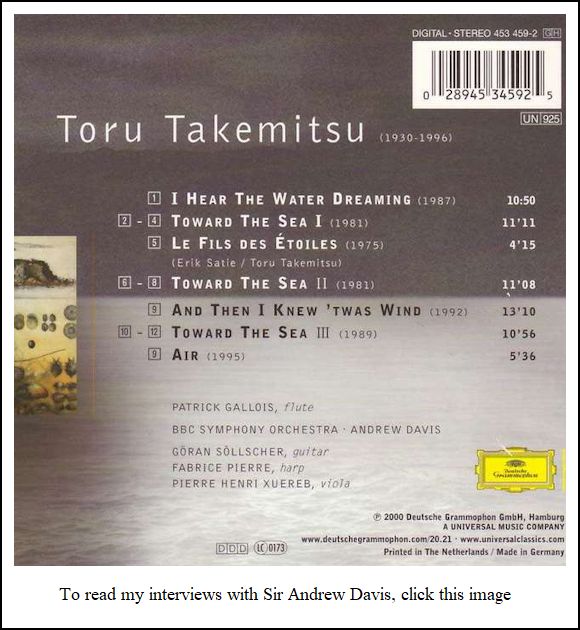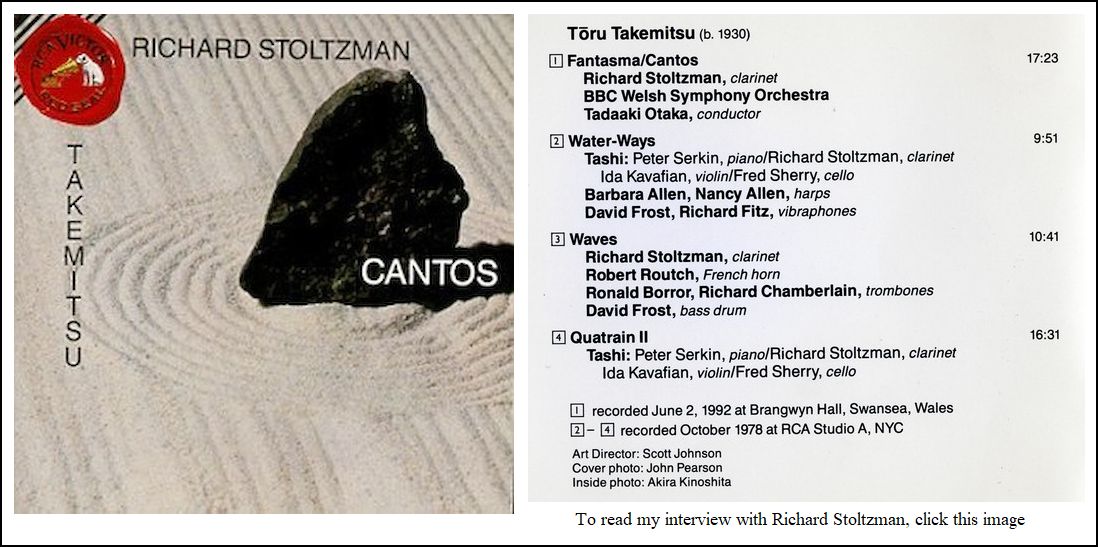Toru Takemitsu Interview with Bruce Duffie . . . . . . . . . (original) (raw)
Composer Tōru Takemitsu
A Conversation with Bruce Duffie
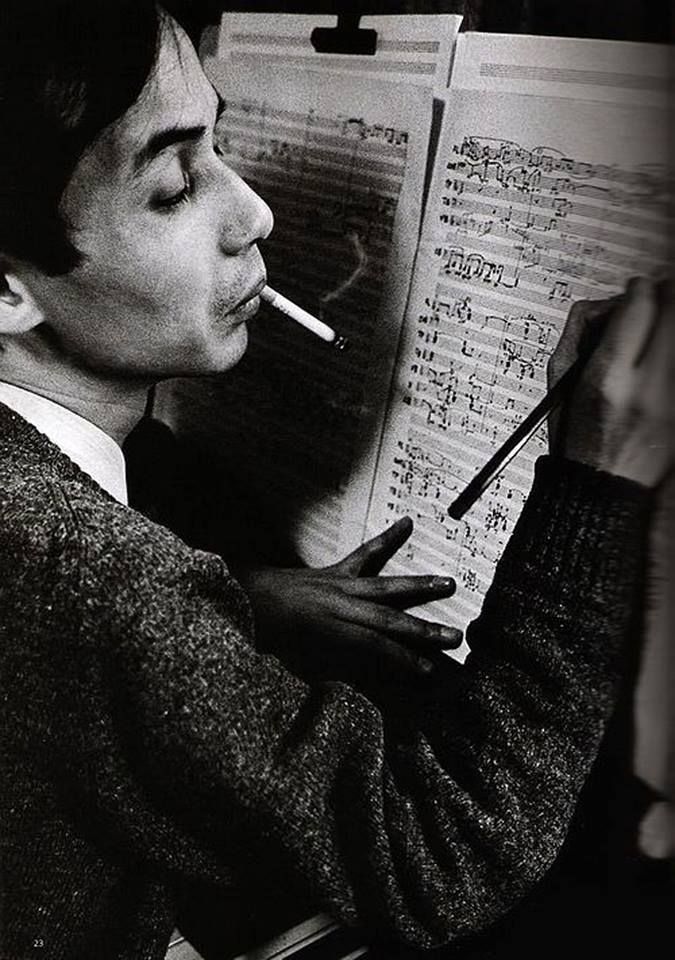
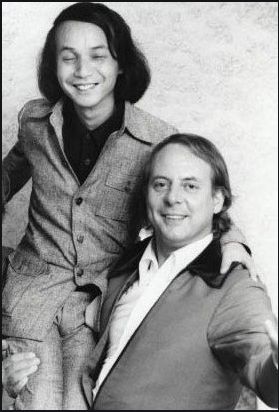 Tōru Takemitsu (武満 徹) was born in Tokyo on October 8, 1930. He began attending the Keika Junior High School in 1943 and resolved to become a composer at the age of sixteen.
Tōru Takemitsu (武満 徹) was born in Tokyo on October 8, 1930. He began attending the Keika Junior High School in 1943 and resolved to become a composer at the age of sixteen.
During the post-war years, he came into contact with Western music through radio broadcasts by the American occupying forces – not only jazz, but especially classical music by Debussy and Copland and even by Schoenberg. He made his debut at the age of twenty with a piano piece Lento in Due Movimenti.
Although Takemitsu was essentially a self-taught composer, he nevertheless sought contact with outstanding teachers: Toshi Ichiyanagi acquainted the composer with the European avant-garde of Messiaen, Nono, and Stockhausen (shown together in photo at right), and Fumio Hayasaka introduced Takemitsu to the world of film music and forged contacts to the film director Akira Kurosawa for whom Takemitsu produced several scores to film plots.
Alongside his musical studies, Takemitsu also took a great interest in other art forms including modern painting, theatre, film and literature (especially lyric poetry). His cultural-philosophical knowledge was acquired through a lively exchange of ideas with Yasuji Kiyose paired with his own personal experiences.
In 1951, the group “Experimental Workshop” was co-founded by Takemitsu, other composers and representatives from a variety of artistic fields; this was a mixed media group whose avant-garde multimedia activities soon caused a sensation.
Takemitsu taught composition at Yale University and received numerous invitations for visiting professorships from universities in the USA, Canada and Australia.
He died in Tokyo on February 20, 1996.
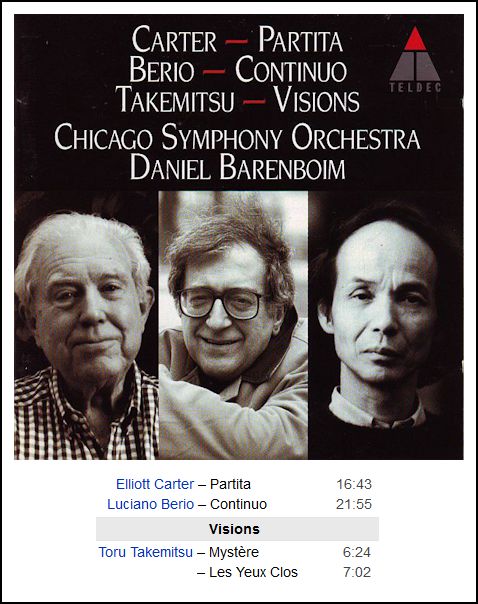 In March of 1990, Tōru Takemitsu was in Chicago for the premiere of his new work Visions. It had been commissioned by the Chicago Symphony, and the performance was later issued on CD, along with works by Elliott Carter andLuciano Berio, all conducted by Daniel Barenboim. [_Names which are links refer to my interviews elsewhere on my website._]
In March of 1990, Tōru Takemitsu was in Chicago for the premiere of his new work Visions. It had been commissioned by the Chicago Symphony, and the performance was later issued on CD, along with works by Elliott Carter andLuciano Berio, all conducted by Daniel Barenboim. [_Names which are links refer to my interviews elsewhere on my website._]
It was an especially busy time for the composer, but he graciously agreed to meet with me at his hotel for an interview a couple of days before the premiere.
His English was not bad, but I could see a bit of frustration when he was not able to express his ideas as freely as he would have liked. In any event, he considered his words carefully, and even though his construction was awkward, what he was saying was clear. In this presentation, without altering his meanings in any way, I have straightened out the structure so that readers will understand him as well as I did both then and now.
Bruce Duffie: I assume you receive many, many commissions.
Tōru Takemitsu: Yes.
BD: How do you decide which ones you will accept and which ones you will turn aside?
Takemitsu: It depends on the orchestra, and it depends on the musicians who I love and admire. The Chicago Symphony is now so very famous, the world’s best orchestra I know. I have heard many performances through discs, but once, quite a long time ago, I have heard their live performance in Chicago. So, why not accept this commission? I am very honored to be selected as one of the composers writing music for Chicago Symphony centennial.
BD: The piece is entitled Visions, and yet it is something purely for the ear. How do you reconcile these two ideas?
Takemitsu: I decided on the title Visions because when I was asked to write this for Chicago Symphony, I had some beautiful memories of Chicago. I have very bad chronological memories, so I don
’t remember exactly what year it was, but I think around ’68, on my way back from Toronto. I really love to visit Chicago, and I was supposed to stay just one day. But after I had arrived here, the airport was closed because of a snowstorm, a blizzard, so I had to stick around for one week. [Both laugh] But it was very good for me, fortunately because I visited the Art Institute of Chicago, and I saw many beautiful paintings. It was especially good when someone showed me an original lithograph of Odilon Redon, the French painter. I was so impressed with that lithograph, so when I received the invitation from the Chicago Symphony, suddenly I was reminded of this experience. I really wanted to write something about Redon, and then I wrote Visions. The work is actually in two parts, and each one has Redon’s name of a painting. One part is called Mystère [Mystery], and the other piece is called_Les yeux clos_, which means Eyes Closed. [_He apologized for his awkward English, and I reassured him that I understood what he was trying to say._]
BD: As with your music, you are bringing your ideas across very well. Do you have any trouble expressing your musical ideas, which are contained in your heart and in your mind, through the paper, and then through the other musicians?
Takemitsu: It’s a very hard question. Always, when I compose music, I need some concrete interpreters, so I can’t compose music for someone in an abstract sense. Every time I write music, especially chamber music, I always imagine some specific musicians. This time it was the Chicago Symphony Orchestra. An orchestra has many functions, and so many different musicians. There are almost one hundred different people, and they may have different thoughts, different ideas, different time cycles of life. However, this time, Daniel Barenboim will conduct my piece. I don’t know him personally well, but I know his music very well for quite a long time. And, of course, I know the brilliant sound from Chicago Symphony Orchestra. My music is sometimes very calm, and not like a golden brass sound, so it was, for me, quite a challenge to write a piece for this orchestra, and especially the brass section. I love the brass section, but it is quite different from my music. So, I expected very much to expand myself by the Chicago Symphony.
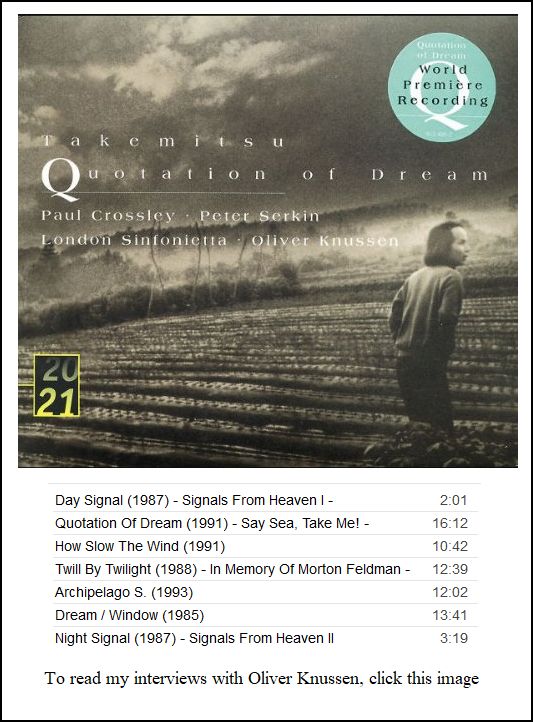 BD: You let your ideas be molded by the possibilities of our orchestra?
BD: You let your ideas be molded by the possibilities of our orchestra?
Takemitsu: Yes. Now, I’m getting so nervous because I did so many new things in the orchestration. I used many low instruments including contrabass clarinet, bass flute, bass trumpet...
BD: [Sneaking in my own background] Contrabassoon?
Takemitsu: [Smiles] Contrabassoon, of course, and some brass chorus playing forte. Mostly my music is pianissimo, not forte, but this time I used many _forte_s.
BD: Does this reflect the loudness of the orchestra, or just the loudness of the city of Chicago?
Takemitsu: No, it’s the influence of the Chicago Symphony, but a very gentle forte, I think.
BD: When you’re writing a piece of music, and you’re putting the ideas down on paper, are you always controlling the pencil and the notes that go on the paper, or are there times when the pencil is controlling your hand?
Takemitsu: [Laughs] Oh, I’m mostly erasing, using the eraser.
BD: You are finding better ways to express your ideas?
Takemitsu: I don’t know. When I was young, sometimes I could see some inspiration between myself and the pencil. Some inspiration came, and the pencil would run, which was a treat. But now as I’m getting older, unfortunately, the inspirations do not visit me often.
BD: Then do you rely more on your technique?
Takemitsu: I rely on my experience, although it’s not good. Music should be sensual. I mean, of course, some musical knowledge and technique is very important, but I really love to have something from a medium. I don’t like to use the word
‘heaven’, but maybe some voices from there help me.
BD: You are the medium from Heaven?
Takemitsu: Through my body, yes.
BD: And then your music goes through the pencil?
Takemitsu: Yes. Through my pencil.
BD: And then to the audience?
Takemitsu: Sure. I think composers should be listeners first. Of course, composers like composing music, but composers should be first listeners. When I listen to something new, I like to always train my own imagination to be young. I love doing that.
BD: You bring the rich Japanese tradition and ideas into your music, and you’re combining that with Western styles. Are you making a soup where they are blended, or are you making a multicourse meal where everything is distinct?
Takemitsu: I have tried to do some blending between East and West. I am using the Western conventional instruments, the Western orchestra, but at the same time I admire my own tradition. I really love to write something Japanese, but it’s very hard to blend each to the other at once. I have tried many times, but I fear there is some contradiction in the sense of timing, and sense of color, and sense of space. There are some essential differences. I'm a Japanese, but my daily life is just like yours. I wear Western clothes, and I eat sandwiches and beef steak, but still, I feel there is some difference. Maybe the younger generations in Japan haven
’t got feelings like mine. They can provide blending of the East and West. They are able to combine. When I decided to be a composer, it was just after the Second World War. At that time, I hate everything from Japan because of the war. During the war, we had very sad times, especially musical. The Japanese government said very stupid ideas, and mostly never permitted us to listen to Western music. So, I was real thirsty to listen to Western music. Then, just after the war, I decided to be a composer, but I wanted to be a Western composer. I didn’t like all the Japanese traditions. I didn’t know anything, and I didn’t want to study my own traditional music. But ten years later, after I had studied Western music, I have realized the importance of my own traditions. Then my way became very difficult to be composer, but still I dreamt to be a good Western composer. I don’t know whether I am a good Japanese composer or a bad Japanese composer, but I am Japanese composer. I really want to express something good in a Japanese way. I use the Western conventional orchestra, but it’s still very difficult.
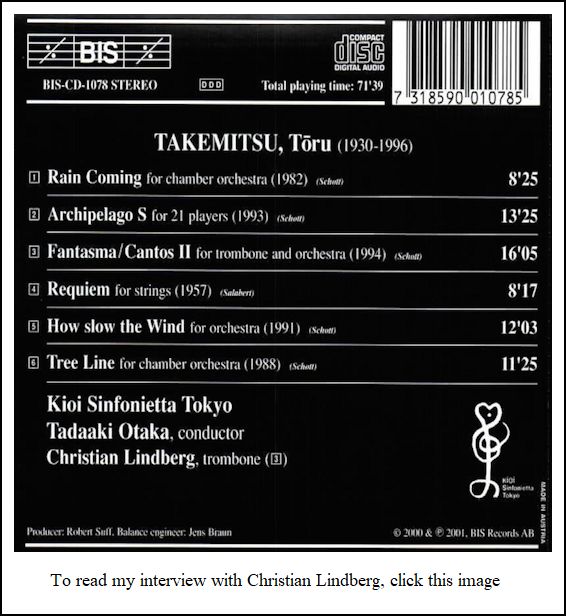 BD: Are you pleased with what you have come up with in your music?
BD: Are you pleased with what you have come up with in your music?
Takemitsu: I like some of my own pieces, but I have never been really satisfied with my music. I think I am still a student. You have a long tradition of your Western music. I have a long tradition of Japanese music, but Western music is more than that. We have just 400 years now. You have more than 600 years. Still, I’m on my way to be a composer and to be great or good. I would like to be great, but it’s okay if I’m only good.
BD: Does it please you that your music has traveled around the world through performances and recordings?
Takemitsu: Yes. Fortunately, yes. Very much. I am very happy.
BD: Are you basically pleased with the performances that you hear either in the live concerts or on the recordings?
Takemitsu: Oh, I love live concert. Of course, the recording sessions are very good as documents, but musical performance is like social activity. An orchestra is like a society. Sometimes a composer’s life is very unhealthy, because I am sticking on chair for a long time and facing just five-line music paper. Sometimes I need a place to hide away, to be isolated.
BD: To hide from the outside world?
Takemitsu: Yes, but not from other composers
. That would be very selfish, very egotistical. But when a piece is played by the orchestra or by other musicians, we have some collaboration, and this is very, very good. For me, it’s very important to meet other musicians who have different ideas from you. It’s very good. They suggest things to me very much. It evokes me very much.
BD: You get your ideas from all over the place?
Takemitsu: Yes.
BD: Are you ever surprised with some of the ideas you come up with?
Takemitsu: Oh yes, sometimes.
BD: What do you expect of the audience, if anything at all, that comes to hear your music?
Takemitsu: My music is not just for entertainment. Sometimes, or mostly, people don’t like my music, but I hope that they sometimes love my music. They sometimes do love my music. I hope, when the audience listens to my music, and after listening to my music, they would change just little bit from before. Then I am very happy.
BD: Change their ideas of life?
Takemitsu: Yes. It’s okay to say anything about it. I do not need the world to change, but this means they go away not the same as they were. It can be a Japanese or Western orchestra. This impression is very good, when someone writes music even in this difficult society. Even when one writes such stupid music, this is very good. It means someone is doing music. This recognition is very important. Artistic music is very much decreasing. Now, what we call music might be any pop music, and not classical music. But I’m doing Western classical music. Why am I doing classical music? After listening to my music, someone thought this is very good.
BD: Do you have some advice for other composers?
Takemitsu: I don’t teach at all. I have no students at all, but I really love to talk with young musicians, young composers. I am very curious to know what
’s happening in the younger generation.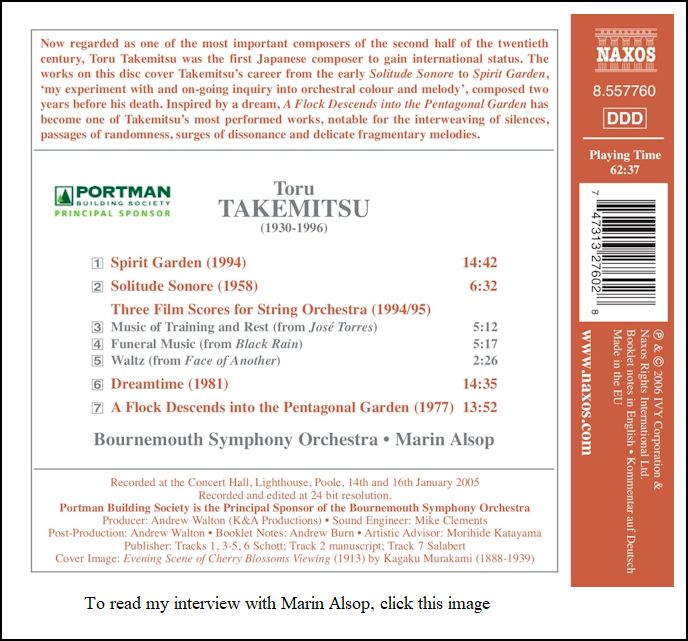 BD: So, rather than advise them, you learn from them?
BD: So, rather than advise them, you learn from them?
Takemitsu: Yes, I learn from them.
BD: [Gently pressing the point] What can they learn from you?
Takemitsu: I don
’t know.
BD: Perhaps, just when listening to your music they will learn?
Takemitsu: I think so. I hope so.
BD: Are you optimistic about the future of music?
Takemitsu: Sometimes I am optimistic, but other times I
’m getting so pessimistic because now it’s very difficult to write orchestral pieces because of situation of the orchestra today. Economically, they have many big problems. Many young composers want to write for the orchestra, but it’s quite rare to be performed. Many, many, many in the audience have left the new music, contemporary music, and this is the fault of the composers. In the ’50s and ’60s, new music was getting so intellectual. Of course, some think it’s very good, but most of them are too intellectual, and most of the time they are using the blackboard for instruction. So, it’s not good. They have left the real joy and sensuality out of their music. The mathematical way to construct music is quite good, and has helped, but music is not mathematics. Music is for the imagination. Now, many composers recognize the efforts from the ’50s and ’60s. Now, we are not afraid to use atonality, twelve-tone, and electronics. We can use everything. We can combine them together in some eclectic way of composing which makes good sense. Many composers are doing that, and I think it’s good, but some music is getting written just for entertainment, and just for amusement.
BD: That’s too far the other way?
Takemitsu: Too far the other way. It’s very, very different, I think.
BD: Then where is the balance between the sensuality and the intellectual stimulation?
Takemitsu: I would like to know that! [Both laugh] We, the artistic composers, should think about the existence of human beings in this world today through music. As a composer, I am always thinking about relation between nature and music, nature and arts, and my music is very much influenced from nature. Now, our atmosphere, the environment is getting to be very worse, and beautiful nature is losing. The environment is damaged. I wrote a piece called Toward the Sea, for flute and guitar. It was commissioned by Greenpeace and written for the Save Whales Campaign. The titles of my music are mostly related to the nature, garden, rain, water.
BD: Winter?
Takemitsu: Winter, of course. It’s important.
Toward the Sea (海へ, _Umi e) is a work by the Japanese composer Tōru Takemitsu, commissioned by Greenpeace for the Save the Whales campaign.
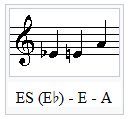 Towards the Sea exists in three separate versions:
Towards the Sea exists in three separate versions:
- The first, composed in 1981 for alto flute and guitar
- The second, also composed in 1981, is for alto flute, harp and string orchestra
- The third, written in 1989, is for alto flute and harp without orchestra.
Each version lasts around eleven minutes. There are numerous recordings of each version.
The work is divided into three sections—The Night, Moby-Dick, and Cape Cod. These titles are in reference to Melville's novel Moby Dick, or The Whale. The composer wished to emphasize the spiritual dimension of the book, quoting the passage, "meditation and water are wedded together". He also said that, "The music is a homage to the sea which creates all things and a sketch for the sea of tonality"; Toward the Sea was written at a time when Takemitsu was increasingly returning to tonality after a period of experimental composition.
Most of the work is written in free time, with no bar lines (except in the second version, to facilitate conducting). In each version, the flute has the primary melodic line, based in part on a motif spelling "sea" in German musical notation: E♭–E–A (S-E-A) shown above. This motif reappeared in several of Takemitsu's later works.
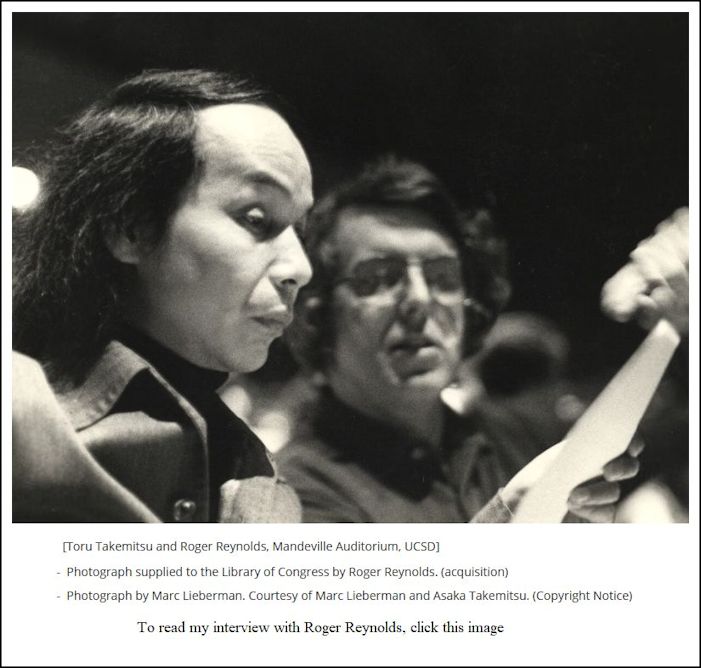
BD: Despite all this, is composing fun?
Takemitsu: Sometimes it is difficult, but I love composing. While I’m composing, I’m very happy.
BD: Are you also happy when you hear the finished product being performed?
Takemitsu: Yes.
BD: Have you conducted some of your music, or do you always leave that to others?
Takemitsu: I never conduct.
BD: Do the conductors or performers ever find things in your scores that you didn’t know you had hidden there?
Takemitsu: Oh, yes. Some conductors interpret beautifully, even more than I expect. It’s very good. It’s the real joy of music for me. I didn’t realize the importance of the conductor’s role, but now I have many experiences with conductors who perform my pieces. When my piece is performed by a different conductor, musically each one is different. Each one has changed every time, and this changing is very interesting. I love that.
BD: Do they ever change it in a way you don’t like?
Takemitsu: Sometimes, but that’s my fault. It’s my responsibility.
BD: You have to be more clear in your directions?
Takemitsu: I don’t want to fix it 100%. I’m not a perfectionist. I like to leave some room for the musicians, the interpreters. I need their help. My music is always changing, like the landscape, the scenario, a garden. Yes, there’s much variety of performances, which is very interesting. At the same time, it’s very important for me. It evokes me to walk the next step.
BD: Thank you for being a composer, and thank you for coming to Chicago.
Takemitsu: Thank you very much. I’m very honored to be invited here.
BD: I look forward to hearing this new piece.
Takemitsu: I hope you like it.
© 1990 Bruce Duffie
This conversation was recorded in Chicago on March 6, 1990. Portions were broadcast on WNIB later that day, and again in October of 1990, 1995, and 2000. This transcription was made in 2020, and posted on this website at that time.
To see a full list (with links) of interviews which have been transcribed and posted on this website, click here. To read my thoughts on editing these interviews for print, as well as a few other interesting observations, click here.
Award - winning broadcaster Bruce Duffie was with WNIB, Classical 97 in Chicago from 1975 until its final moment as a classical station in February of 2001. His interviews have also appeared in various magazines and journals since 1980, and he now continues his broadcast series onWNUR-FM, as well as on Contemporary Classical Internet Radio.
You are invited to visit his website for more information about his work, including selected transcripts of other interviews, plus a full list of his guests. He would also like to call your attention to the photos and information about his grandfather, who was a pioneer in the automotive field more than a century ago. You may also send him E-Mail with comments, questions and suggestions.
